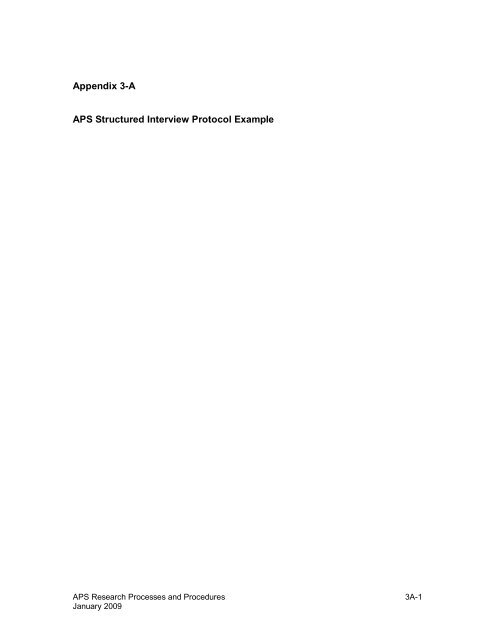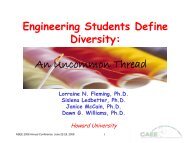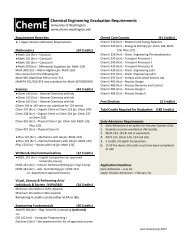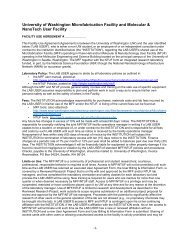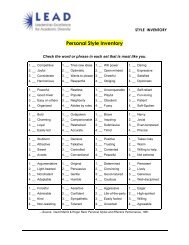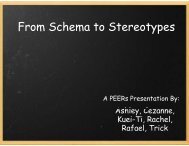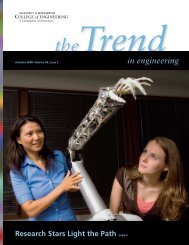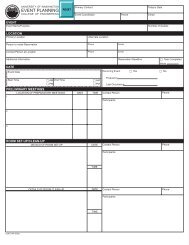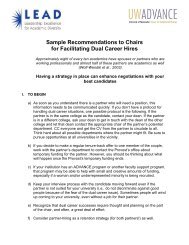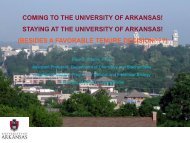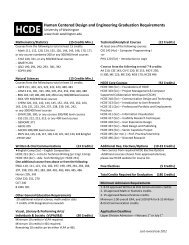Appendix 3-A APS Structured Interview Protocol Example
Appendix 3-A APS Structured Interview Protocol Example
Appendix 3-A APS Structured Interview Protocol Example
- No tags were found...
Create successful ePaper yourself
Turn your PDF publications into a flip-book with our unique Google optimized e-Paper software.
<strong>Appendix</strong> 3-A<strong>APS</strong> <strong>Structured</strong> <strong>Interview</strong> <strong>Protocol</strong> <strong>Example</strong><strong>APS</strong> Research Processes and Procedures 3A-1January 2009
PART I.ACADEMIC PATHWAYS STUDYINTERVIEW PROTOCOL (EXAMPLE)TECHNICAL PUBLIC INSTITUTION/URBAN PRIVATEUNIVERSITY/ SUBURBAN PRIVATE UNIVERSITY/LARGE PUBLIC UNIVERSITYINSTRUCTIONSGood morning (afternoon). My name is ___. Thank you for coming. This interviewinvolves two parts. The first part is a survey, in which I will ask you about yourexperiences as a student at this university. The purpose is to get your perceptions of yourexperiences inside and outside of the classroom. There are no right or wrong ordesirable or undesirable answers. I would like you to feel comfortable with saying whatyou really think and how you really feel. The second part is a short pencil-and-papertask, and I will give you specific instructions for completing that task once we havefinished with the survey.TAPE RECORDER INSTRUCTIONSIf it is okay with you, I will be tape-recording our conversation. The purpose of this is sothat I can get all the details but at the same time be able to carry on an attentiveconversation with you. I assure you that all your comments will remain confidential. Iwill be compiling a report which will contain all students’ comments without anyreference to individuals.PREAMBLE/CONSENT FORM INSTRUCTIONSBefore we get started, please take a few minutes to read this preamble (read and sign thisconsent form). (Hand R consent form/preamble.) (After R returns preamble/consentform, turn tape recorder on.)Q1. What is your major?Q2. What year did you graduate from high school?Q3. Did you participate in a Freshman Summer Bridge Program the summer after yougraduated from high school?YesNoSkip to Q4Q3a. What were the most helpful aspects of that program?3A-2 <strong>APS</strong> Research Processes and ProceduresJanuary 2009
Q4. Are you a member of any engineering student organizations on campus?YesNoSkip to Q5Q4a. What are those organizations?Q4b. What are the most helpful aspects of that/those organization(s)?Q5. In your own words, would you please define engineering?Q6. Are there particular skills that you would say are important for an engineer to have?YesNoSkip to Q7Q6a. (IF NOT ALREADY ANSWERED) What are those skills?Q6b. Of the skills that you mentioned, which ones do you possess?Q6c. Please tell me about how you developed your skill(s)?<strong>APS</strong> Research Processes and Procedures 3A-3January 2009
Q7. Have you had any experiences inside or outside of your classes that have enabledyou to be creative?YesIf R asks for definitionNoSkip to Q8Say “Just whatever itmeans to you – anythingyou would call creative”Q7a. (IF NOT ALREADY ANSWERED) Please describe those experiences.Q8. Have you had any experiences inside or outside of your classes that have preventedyou from being creative?YesNoSkip to Q9Q8a. (IF NOT ALREADY ANSWERED) Please describe those experiences.3A-4 <strong>APS</strong> Research Processes and ProceduresJanuary 2009
Q9. Have you had any experiences inside or outside of your classes that have enabledyou to solve problems?YesIf R asks for definitionSay “Just whateverproblems come to yourmind”NoSkip to Q10Q9a. (IF NOT ALREADY ANSWERED) Please describe those experiences.Q10. Have you had any experiences inside or outside of your classes that have preventedyou from solving problems?YesNoSkip to Q11Q10a. (IF NOT ALREADY ANSWERED) Please describe those experiences.<strong>APS</strong> Research Processes and Procedures 3A-5January 2009
Q11. Have you had any experiences inside or outside of your classes that have enabledyou to develop general engineering knowledge?YesIf R asks for definitionNoSkip to Q12Say “Just whatever itmeans – anything thatcomes to your mind”Q11a. (IF NOT ALREADY ANSWERED) Please describe those experiences.Q12. Have you had any experiences inside or outside of your classes that have preventedyou from developing general engineering knowledge?YesNoSkip to Q13Q12a. (IF NOT ALREADY ANSWERED) Please describe those experiences.3A-6 <strong>APS</strong> Research Processes and ProceduresJanuary 2009
Q13. Where do you see evidence of your engineering aptitude?If R asks what is aptitudeOtherwise, after Rresponds go to Q14SAY “Just whatever it means to you– anything that comes to your mind”Q14. On a scale from 0 – 10, (where 0 = not confident at all and 10 = extremelyconfident), how confident are you in your math ability? ______Q14a. Describe the experiences that led you to rate yourself in this way.(REMIND THEM OF SCORE IF THEY ASK.)Q15. On a scale from 0 – 10, (where 0 = not confident at all and 10 = extremelyconfident), how confident are you in your science ability? ______Q15a. Describe the experiences that led you to rate yourself in this way.(REMIND THEM OF SCORE IF THEY ASK.)Q16. On a scale from 0 – 10, (where 0 = not confident at all and 10 = extremelyconfident), how confident are you in your design ability? ______Q16a. Describe the experiences that led you to rate yourself in this way.(REMIND THEM OF SCORE IF THEY ASK.)<strong>APS</strong> Research Processes and Procedures 3A-7January 2009
Q17. Are there any aspects of engineering that you particularly like?YesNoSkip to Q18Q17a. (IF NOT ALREADY ANSWERED) What are some of those?Q18. Are there any aspects of engineering that you particularly dislike?YesNoSkip to Q19Q18a. (IF NOT ALREADY ANSWERED) What are some of those?Q19. In general, how do you feel about engineers?Q19a. (IF NOT ALREADY ANSWERED) And why?Q20. How do you believe members of other professions feel toward engineers?Q20a. (IF NOT ALREADY ANSWERED) And why?3A-8 <strong>APS</strong> Research Processes and ProceduresJanuary 2009
Q21. Are any of your family members or close acquaintances working engineers?YesNoSkip to Q22Q21a. (IF NOT ALREADY ANSWERED) Who?Q21b. Did their experiences influence your decision to become anengineer?YesNoSkip to Q22Q21c. (IF NOT ALREADY ANSWERED) How?Q22. How important is being an engineering student to how you feel about yourself?Q22a. (IF NOT ALREADY ANSWERED) And why?Q23. How committed are you to pursuing an engineering major?Q23a. (IF NOT ALREADY ANSWERED) And why?Q24. What do you see yourself doing after graduation?<strong>APS</strong> Research Processes and Procedures 3A-9January 2009
Q25. Are there any aspects of your education at this institution that you find particularlydifficult in achieving your academic goals?YesNoSkip to Q26Q25a. (IF NOT ALREADY ANSWERED) Please tell me about thosedifficulties.Q25b. How do you deal with those difficulties?Q26. Are there any aspects about being an engineering major at this institution that youfind particularly difficult in achieving your academic goals?YesNoSkip to Q27Q26a. (IF NOT ALREADY ANSWERED) Please tell me about thosedifficulties.Q26b. How do you deal with those difficulties?3A-10 <strong>APS</strong> Research Processes and ProceduresJanuary 2009
Q27. Are there any aspects of your education at this institution that you find particularlyhelpful in achieving your academic goals?YesNoSkip to Q28Q27a. (IF NOT ALREADY ANSWERED) Please tell me about thosehelpful aspects.Q28. Are there any aspects of being an engineering major at this institution that you findparticularly helpful in achieving your academic goals?YesNoSkip to SECTION IIQ28a. (IF NOT ALREADY ANSWERED) Please tell me about thosehelpful aspects.<strong>APS</strong> Research Processes and Procedures 3A-11January 2009
SECTION II.PERFORMANCE TASK (USED IN YEARS 1 AND 3)INSTRUCTIONS:At this time, I'd like to ask you to work on a short activity. While I hope that it is a funactivity for you, I would also like you to give it your best effort. You have up to tenminutes to work on it. Please let me know if you are done before that. Do you have anyquestions? OK, here is the activity—I’m going to read it with you, out loud (CHECKSTART TIME ON AUDIO RECORDER AND INDICATE IT IN THE BOX BELOW.THEN HAND R THE PERFORMANCE TASK FORM.).Start time:RECORD TIME HEREPTQ1: (NEXT READ THE FOLLOWING ALOUD TO R) Over the summer theMidwest experienced massive flooding of the Mississippi River. What factorswould you take into account in designing a retaining wall system for theMississippi?TRANSITION:(CHECK END TIME ON AUDIO RECORDER, AND IF NECESSARY): Okay, it’sbeen 10 minutes now, please stop.End time:RECORD TIME HEREPTQ2: What questions came to your mind as you were brainstorming your list?(THE QUESTIONS NEED TO BE FULLY FORMULATED. IF R OFFERS AFRAGMENT AS A QUESTION, INSTRUCT HIM/HER TO CLARIFY HOW HE/SHEUSED IT IN A QUESTION AND TO STATE THE FULL QUESTION. IT IS OKAYFOR R TO BROWSE THROUGH THE LIST OF FACTORS HE/SHE HAS WRITTEN,BUT THERE IS NO NEED TO SUGGEST THIS IN YOUR INSTRUCTIONS. RSHOULD BE ABLE TO PROVIDE 5-10 QUESTIONS IN 2-3 MINUTES.)TRANSITION:(COLLECT PAPER) Great! Thank you. We hope that you’ve enjoyed this activity and wewant to make sure that you know that there are many right answers. We’ve used it tocollect information from engineering students across the nation to understand the typesof things students think about.3A-12 <strong>APS</strong> Research Processes and ProceduresJanuary 2009
Over the summer the Midwest experienced massive flooding of the MississippiRiver. What factors would you take into account in designing a retaining wallsystem for the Mississippi?<strong>APS</strong> Research Processes and Procedures 3A-13January 2009
SECTION II.PERFORMANCE TASK (USED IN YEARS 2 AND 4)INSTRUCTIONS:At this time, I'd like to ask you to work on a short activity. This is the kind of activity thathas many different kinds of answers. We would like you to give it your best effort. Youhave up to fifteen minutes to work on it. I will let you know when there is five minutes left,so you have an idea about how much time has passed. Please let me know if you aredone before the fifteen minutes is up. Do you have any questions? OK, here is theactivity. (CHECK START TIME ON AUDIO RECORDER AND INDICATE IT INTHE BOX BELOW. THEN HAND R THE PERFORMANCE TASK FORM.).Start time:RECORD TIME HEREPTQ1. (ALLOW THE STUDENT TO READ AND SOLVE THE PROBLEM ONTHEIR OWN)TRANSITION:(CHECK END TIME ON AUDIO RECORDER, AND IF NECESSARY):Okay, it’s been 10 minutes now; you have 5 more minutes to solve the problem.Okay, it’s been 15 minutes now, please stop.End time:RECORD TIME HEREPTQ2. What questions came to your mind as you were solving the problem? Please voiceyour thoughts in the form of questions as if you are playing Jeopardy.(THE QUESTIONS MUST BE FULLY FORMULATED. IF R OFFERS AFRAGMENT AS A QUESTION, REMIND R TO SPEAK AS IF HE/SHE IS PLAYINGJEOPARDY, AND ASK R TO CLARIFY HOW HE/SHE USED THE FRAGMENT INA QUESTION. IF R IS NOT FAMILIAR WITH JEOPARDY, TELL R THAT IT ISOKAY, AND THAT ALL HE/SHE NEEDS TO DO IS TO RESPOND IN QUESTIONSONLY. IT IS OKAY FOR R TO BROWSE THROUGH THE LIST OF SOLUTIONSHE/SHE HAS WRITTEN, BUT THERE IS NO NEED TO SUGGEST THIS IN YOURINSTRUCTIONS. IF R OFFERS 2 QUESTIONS OR LESS, PROMPT HIM/HERAGAIN. R SHOULD BE ABLE TO PROVIDE 5-10 QUESTIONS IN 2-3 MINUTES.)3A-14 <strong>APS</strong> Research Processes and ProceduresJanuary 2009
PTQ3. To what extent do you feel this is an engineering problem?PTQ3a. (IF NOT ALREADY ANSWERED) And why?PTQ4. What knowledge and skills helped you solve the problem?PTQ5. Where did you develop your knowledge and skills to solve the problem?PTQ5a. (IF NOT ALREADY ANSWERED) Please describe those experiencesin more detail.TRANSITION:(COLLECT PAPER) Great! Thank you. We hope that you’ve enjoyed this activity and wewant to make sure that you know that there are many right answers. We’ve used it tocollect information from engineering students across the nation to understand the typesof things students think about.<strong>APS</strong> Research Processes and Procedures 3A-15January 2009
Respondent ID: _____________As an engineer, you have been asked to solve a problem on the State University campus.Just like campuses across the country, the State University campus is often overcrowdedwith pedestrians crossing the streets.One busy intersection on campus is the crossing of Fifth Ave. in front of the bookstore.Dangers at this intersection include heavy traffic and busses which run against thegeneral traffic flow (see diagram below). The University would like to design a costeffective method for students to cross Fifth Ave. which would reduce the possibility ofaccidents at this intersection. You have been assigned to design a solution to thisproblem for presentation to the University Traffic Committee.In the process of designing your solution you have been asked to respond to the set ofquestions on the following pages. The interviewer has more paper if you need it.3A-16 <strong>APS</strong> Research Processes and ProceduresJanuary 2009
1 – What is the problem as you see it?2 – List potential solution(s) for this problem.3 – From your list in Question 2, choose the potential solution you think is best andprovide a detailed evaluation of your solution.4 – What kinds of additional information would help you solve this problem?<strong>APS</strong> Research Processes and Procedures 3A-17January 2009
SECTION IV.DEBRIEFING(READ ALL OF THE FOLLOWING ALOUD TO R.)Thank you very much for coming this morning (afternoon). Your time is very muchappreciated and your comments have been very helpful.The purpose of this interview is to better understand students’ perceptions of theirexperiences inside and outside of the classroom. We are interested in your opinions andyour reactions. In no way is this interview designed to individually evaluate a person’sabilities. The task is not diagnostic, nor can it provide a measure of the “quality” of yourperformance. Your only requirement was to do the best job that you could.The results of this research will provide useful information to engineering educators, inhelping them to structure educational programs that students consider to be most effectiveand ideal in helping them through college.You will be kept anonymous during all phases of this study including any experimentalwritings, published or not. Procedures for maintaining confidentiality are as follows: (1)individual participants’ results will be pooled with group results; and (2) participants shouldnot place any identifying information on data collection instruments. (Such identifiersinclude name, social security number, student identification number, specific birth data,telephone number, address, etc.)DQ1. Is there any other information regarding your experience that you think would beuseful for me to know?YesNoDQ1a. (IF NOT ALREADY ANSWERED) Please share that information withme.Again, thank you for participating. (TURN TAPE-RECORDER OFF.)3A-18 <strong>APS</strong> Research Processes and ProceduresJanuary 2009
SECTION VI.PROBES FOR FORMAL INTERVIEW<strong>Interview</strong>er’s ProbeRepeat Question……………………………Anything else?..............................................Any others?...................................................How do you mean?.......................................Could you tell me more about yourthinking on that?...........................................Would you tell me what you havein mind?........................................................What do you mean?......................................Why do you feel that way?...........................Which would be closer to the wayyou fell?........................................................AbbreviationRQAE or Else?AO?How mean?Tell moreWhat in mind?What mean?Why?Which closer?3A-20 <strong>APS</strong> Research Processes and ProceduresJanuary 2009
SECTION VII.POTENTIAL QUESTIONS R MAY ASK (AND APPROPRIATE ANSWERS):1. What is a factor?You just need to “ List the things that you would take into account in designing aretaining wall system for the Mississippi.”2. What is a retaining wall system?A system that keeps water inside the river.3. What is massive flooding?When a lot of water does not stay inside the river.4. Is a wall necessary? / Does it need to be a wall? / Why a retaining wall?You can interpret the question however you like.5. Who asked to have the wall built?I don’t have any information on that.6. Midwest of what?The Midwest of the United States.7. The whole Mississippi, or just part of it?You can do what you like.8. List vs. picturesYou can do what you like.9. Quantity vs. quality of responses.You can do what you like.10. What do they use now to control the flooding?I don’t have any information on that.11. Does this mean a retaining wall like on the sides of the river?Yes, it is a system that keeps water inside the river.12. Is that what you want(ed)?That’s great! Thanks!<strong>APS</strong> Research Processes and Procedures 3A-21January 2009


